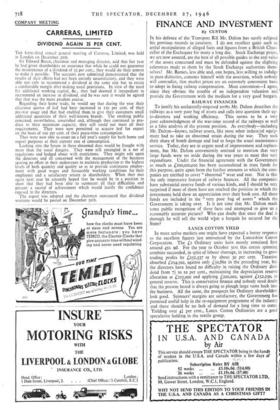FINANCE AND INVESTMENT
By CUSTOS
IN his defence of the Transport Bill Mr. Dalton has surely eclipsed his previous records in casuistry. I do not recollect quite such an artful manipulation of alleged facts and figures from a British Chan- cellor of the Exchequer for many a long day. Stock Exchange prices, we are now assured, are the best of all possible guides to the real value of the assets concerned and must be defended against the slighting references made to them by the Stock Exchange authorities them- selves! Mr. Barnes, less able and, one hopes, less'oilling to indulge in pure dialectics, contents himself with the assertion, which nobody will contradict, that market prices are an extremely convenient basis to adopt in fixing railway compensation. Most convenient—I agree, since they obviate the trouble of an independent valuation and provide the Government with the medium for a very good bargain.
RAILWAY FINANCES
To justify his unilaterally-imposed tents Mr. Dalton describes the railways as a very poor bag of assets and calls into question their up- to-dateness and working efficiency. This seems to be a very poor acknowledgment of the war-time record of the railways as well as a false analysis of the present position. As everybody—including Mr. Dalton—knows, railway assets, like most other industrial equip- ment had to take an abnormal strain during the war. They took their share of bomb damage and had to forgo the usual maintenance service. Today, they are in urgent need of improvement and replace- ment, but Mr. Dalton conveniently omitted to mention that very large funds were set aside during the war years to meet this very expenditure. Under the financial agreement with the Government as much as £200,000,000 has been accumulated in trust funds for this purpose, quite apart from the further amounts to which the com- panies are entitled to cover " abnormal " wear and tear. Nor is this the only impressive feature of railway finances. All the companies have substantial reserve funds of various kinds, and I should be very surprised if most of them have not reached the position in which the investments held show an appreciation over their book cost. All these funds are included in the " very poor bag of assets " which the Government is taking over. Is it not time that Mr. Dalton made some public recognition of these facts and attempted to give us a reasonably accurate picture? Who can doubt that once the deal is through he will tell the world wItat a bargain he secured for die State?
LANCS COTTON YIELD
In more active markets one might have expected a better response
to the excellent figures just announced by the Lancashire Cotton Corporation. The LI Ordinary units have merely remained firm around 45s. gd. For the year to October 31st this cotton spinning combine succeeded, in spite of labour shortage, in increasing its gross trading profits by £252,337 Or by about 3o per cent. Taxation absorbed £254,500, against only £50,860 in the preceding year, but the directors have found no difficulty in raising the Ordinary divi- dend from 71 to ro per cent., maintaining the depreciation reserve allocation at £225,000 and applying £200,000, 'against £152,250, to general reserve. This is conservative finance and nobody need doubt that the present board is always going to plough large sums back into the business. All the same, the prospects for Ordinary shareholders look good. Spinners' margins are satisfactory, the Government has promised useful help in the re-equipment programme of the industry and there should be no lack of demand for a long time to come.
Yielding over 4+ per cent., Lancs. Cotton Ordinaries are a good speculative holding in the textile group.






























 Previous page
Previous page